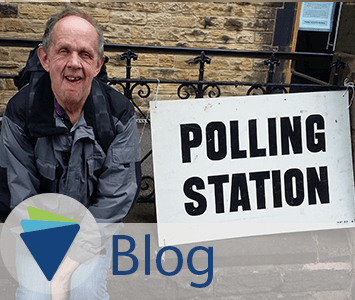Anyone listening to BBC local radio on Tuesday may hear my colleagues Tracey and Jordan discussing the importance for people with learning disabilities to vote in the forthcoming election, and our Love Your Vote campaign.
Turnout in our million-strong community has historically been abysmally low. It’s no surprise, therefore, if learning disabilities and autism will not feature at all in the manifestos and debates. Rightly or wrongly, he who shouts loudest, gets served first.
If you don’t vote, you don’t have the right to complain when policies go against you. And when we first surveyed the people we support we were shocked to discover that less than 10% had voted. The pattern was the same in the wider learning disability community.
Voting with a learning disability
As Jordan explains on the radio, voting is important to him. But when he first became eligible to vote, he was denied that right. Jordan needs specific reasonable adjustments, and needs his mum to be allowed to enter the booth to support him. Neither was permitted at his local polling station – quite against the law.
Jordan’s experience is not uncommon. We hear stories of people being refused access to vote for all sorts of spurious reasons. Perceived mental incapacity. A refusal of support. No reasonable adjustments. Inaccessible polling stations. None of this is acceptable in a democracy.
This is why, in 2017 as part of our Love Your Vote campaign, Dimensions has created a ‘voting passport.’ Anyone can use it. You can write on it the reasonable adjustments that will help you to vote, and on the reverse there is a reminder of the law in case you have trouble in the polling station. We hope it will help many more people to vote successfully in the next election.
Of course, if you’re not registered, you can’t vote. So do download the voting passport but please also go to gov.uk to register to vote and make sure your vote can count. The strength of our collective voice depends on it.
Love Your Vote
Love Your Vote is a campaign to make politics and voting more accessible for people with learning disabilities and autism.
In 2015 Barry, who is 68 and has severe learning disabilities, cerebral palsy, quadriplegia and is non-verbal, was supported to vote for the first time in his life.
We want to see even more stories like Barry’s.
Through the campaign we will:
- provide resources for people with learning disabilities and autism, support staff and carers
- publish a Dimensions Voting Passport to show polling staff how someone wants to be supported and their rights to vote
- run accessible workshops on politics and voting
- campaign for the voice of the learning disability and autism community to be heard
- provide support and advice.
Find out more about Love Your Vote
Follow DimensionsUK on Facebook and Twitter to stay up to date about #LoveYourVote.
